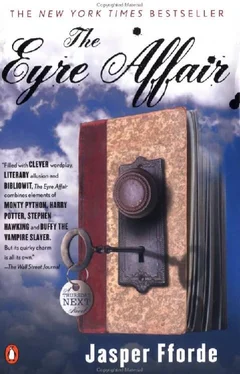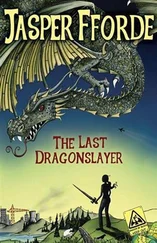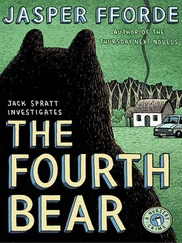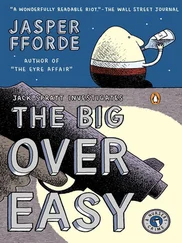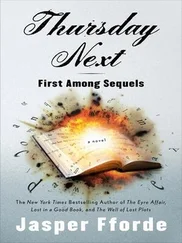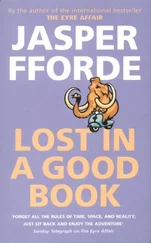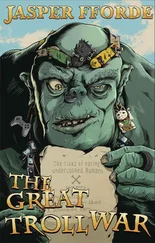We looked at the crowd below. ‘To be truthful, no.’
Braxton’s reserve was all gone. He wiped his brow; his hand was visibly shaking.
‘What am I going to do? This is off the record but Jack Schitt takes over in a week if this whole stinking matter hasn’t made any favourable headway.’
‘Schitt isn’t interested in Jane,’ I said, following Braxton’s gaze over the mass of Bronte fans. ‘All he wants is the Prose Portal.’
‘Tell me about it, Next. I’ve got seven days to obscurity and historical and literary damnation. I know we’ve all had our differences in the past, but I want to give you the freedom to do what you need to do. And,’ he added magnanimously, ‘this is irrespective of cost.’ He checked himself and added: ‘But having said that, of course, don’t just spend money like water, okay?’
He looked at the lights of Swindon again.
‘I’m as big a fan of the Brontes as the next man, Victor. What will you have me do?’
‘Agree to his terms whatever they are; keep our movements completely and utterly secret from Goliath; and I need a manuscript.’
Braxton narrowed his eyes.
‘What sort of manuscript?’
Victor handed him a scrap of paper. Braxton read it and raised his eyebrows.
‘I’ll get it,’ he said slowly, ‘even if I have to steal it myself!’
31. The People’s Republic of Wales
‘Ironically, without the efficient and violent crushing of the simultaneous Pontypool, Cardiff and Newport risings in 1839, Wales might never have been a republic at all. Under pressure from landowners and a public outcry at the killing of 236 unarmed Welsh men and women, the Chartists managed to push the government to early reform of the parliamentary system. Buoyed by success and well represented in the house, they succeeded in securing Welsh home rule following the eight-month “Great Strike” of 1847. In 1854, under the leadership of John Frost, Wales declared its independence. England, weighed down with troubles in the Crimea and Ireland, saw no good reason to argue with a belligerent and committed Welsh assembly. Trade links were good and devolution, coupled with an Anglo-Welsh non-aggression treaty, was passed the following year.’
From Zephania Jones’s. Wales—Birth of a Republic
When the Anglo-Welsh border was closed in 1965, the A4 from Chepstow to Abertawe became an access corridor through which only businessmen or truck drivers were allowed to pass, either to conduct trade in the city or to pick up goods from the docks. On either side of the Welsh A4 there were razor-wire fences to remind visitors that straying from the designated route was not permitted. Abertawe was considered an open city—a ‘free trade zone’. Tax was low and trade tariffs almost nonexistent. Bowden and I drove slowly into the city, the glassy towers and global banking institutions that lined the coast obvious testament to a free trade philosophy that, while profitable, was not enthusiastically promoted by all the Welsh people. The rest of the Republic was much more reserved and traditional; in places the small nation had hardly changed at all over the past hundred years.
‘What now?’ asked Bowden as we parked in front of the Goliath First National Bank. I patted the briefcase Braxton had given me the night before. He had told me to use the contents wisely; the way things were going this was about the last chance we had before Goliath stepped in.
‘We get a lift into Merthyr.’
‘You wouldn’t suggest it unless you had a plan.’
‘I wasn’t wasting my time when I was in London, Bowden. I’ve got a few favours up my sleeve. This way.’
We walked up the road, past the bank and into a side street that was lined with shops dealing in banknotes, medals, coins, gold—and books. We squeezed past the traders, who conversed mostly in Welsh, and stopped outside a small antiquarian bookshop whose window was piled high with ancient volumes of forgotten lore. Bowden and I shared an anxious look and, taking a deep breath, I opened the door and we entered.
A small bell tinkled at the back of the shop and a tall man with a stoop came out to greet us. He looked at us suspiciously from between a shock of grey hair and a pair of half-moon spectacles, but the suspicion turned to a smile when he recognised me.
‘Thursday, bach!’ he murmured, hugging me affectionately. ‘What brings you out this way? Not all the way to Abertawe to see an old man, surely?’
‘I need your help, Dai,’ I said softly. ‘Help like I’ve never needed before.’
He must have been following the news broadcasts because he fell silent. He gently took an early volume of R.S. Thomas out of the hands of a prospective customer, told him it was closing time and ushered him out of the bookshop before he had time to complain.
‘This is Bowden Cable,’ I explained as the bookseller bolted the door. ‘He’s my partner; if you can trust me you can trust him. Bowden, this is Jones the manuscript, my Welsh contact.’
‘Ah!’ said the bookseller, shaking Bowden’s hand warmly. ‘Any friend of Thursday’s is a friend of mine. This is Haelwyn the book,’ he added, introducing us to his assistant, who smiled shyly. ‘Now, young Thursday, what can I do for you?’
I paused.
‘We need to get to Merthyr Tydfil—‘
The bookseller laughed explosively.
‘— tonight,’ I added.
He stopped laughing and walked behind the counter, tidying absently as he went.
‘Your reputation precedes you, Thursday. They tell me you seek Jane Eyre. They say you have a good heart—and have faced wickedness and lived.’
‘What else do people say?’
‘That Darkness walks in the valleys,’ interrupted Haelwyn with a good deal of doom in her voice.
‘Thank you, Haelwyn,’ said Jones. ‘The man you seek—‘
‘—and the Rhonda has lain in shadow these past few weeks,’ continued Haelwyn, who obviously hadn’t finished yet.
‘That’s enough, Haelwyn,’ said Jones more sternly. ‘There are some new copies of Cold Comfort Farm that need to be dispatched to Llandod, hmm?’
Haelwyn walked off with a pained expression.
‘What about—‘ I began.
‘—and the milk is delivered sour from the cows’ udders!’ called Haelwyn from behind a bookshelf. ‘And the compasses in Merthyr have all gone mad these past few days!’
‘Take no heed of her,’ explained Jones apologetically. ‘She reads a lot of books. But how can I help you? Me, an old bookseller with no connections?’
‘An old bookseller with Welsh citizenship and free access across the border doesn’t need connections to get to where he wants to go’
‘Wait a moment, Thursday, bach; you want me to take you to Merthyr?’
I nodded. Jones was the best and last chance I had, all rolled into one. But he wasn’t as happy with the plan as I thought he might be.
‘And why would I want to do that?’ he asked sharply. ‘You know the punishment for smuggling? Want to see an old man like me end my days in a cell on Skokholm? You ask too much. I’m a crazy old man—not a stupid one.’
I had thought he might say this.
‘If you’ll help us,’ I began, reaching into my briefcase, ‘I can let you have… this.’
I placed the single sheet of paper on the counter in front of him; Jones gave a sharp intake of breath and sat heavily on a chair. He knew what it was without close examination.
‘How… how did you get this?’ he asked me suspiciously.
‘The English government rates the return of Jane Eyre very highly—high enough to wish to trade.’
He leaned forward and picked up the sheet. There, in all its glory, was an early handwritten draft of ‘I See the Boys of Summer’, the opening poem in the anthology that would later become 18 Poems, the first published work of Dylan Thomas; Wales had been demanding its return for some time.
Читать дальше
